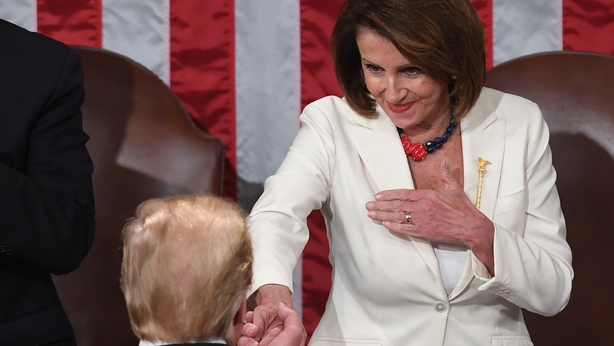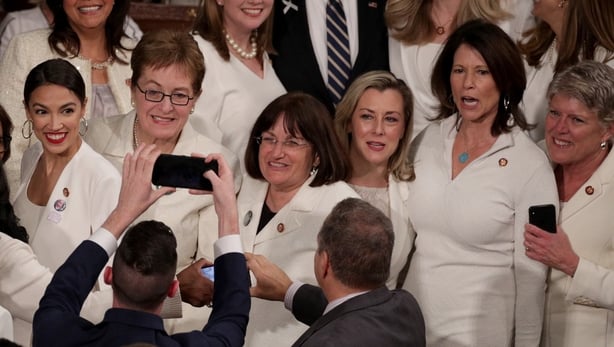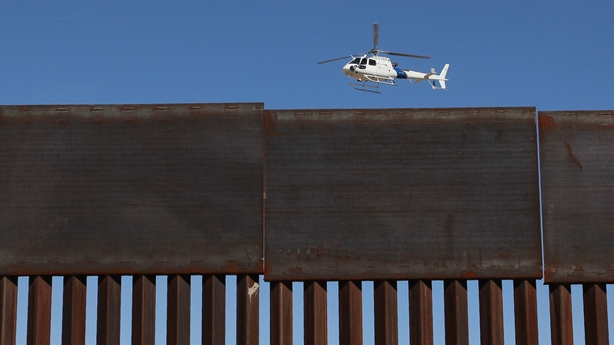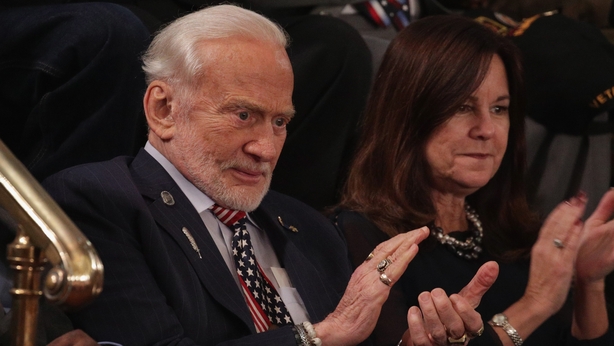President Donald Trump urged Americans to come together in a State of the Union speech seeking to turn the page on two years of divisive turmoil and transform him into a bipartisan national leader.
"We must reject the politics of revenge, resistance, and retribution - and embrace the boundless potential of cooperation, compromise, and the common good," Mr Trump told Congress and a huge television audience.
"We must choose between greatness or gridlock, results or resistance, vision or vengeance, incredible progress or pointless destruction," he said in the speech, which was littered with soaring rhetoric and interrupted continuously by applause from his camp.
We need your consent to load this rte-player contentWe use rte-player to manage extra content that can set cookies on your device and collect data about your activity. Please review their details and accept them to load the content.Manage Preferences
Mr Trump defended his muscular approach to trade with China and other big partners and announced he would extend his trail-blazing personal diplomacy with North Korea by meeting reclusive leader Kim Jong-un on 27-28 February in Vietnam.
.@realDonaldTrump confirms he will meet North Korean leader Kim Jong-un in Vietnam on 27-28 February | https://t.co/8VDxqMdqO0 pic.twitter.com/y5HxJEUR1O
— RTÉ News (@rtenews) February 6, 2019
He touted what he called "the hottest economy anywhere in the world," and called for a bipartisan push to eradicate the AIDS epidemic in the United States in a decade.
Read more:
State of the Union: An olive branch - with thorns
Why Vietnam for second Trump-Kim summit?
But the picture in the US Congress is anything but unified two years into his presidency, with Democrats controlling the House of Representatives, Republicans in charge of the Senate, and Mr Trump finding himself stymied at every turn.

After two years of a presidency in which Mr Trump has driven an already polarised country into bitter, even violent debate over almost every aspect of politics, his words likely fell on many deaf ears.
The moment Mr Trump swung onto his favourite topic of building a wall on the Mexican border to stop what he called an "onslaught" of illegal immigrants, Democrats shook their heads and became restless.
Donald Trump began his State of the Union address with a call for unity - but said the only things that could end the "economic miracle" currently being experienced in the US are "foolish wars, politics, or ridiculous partisan investigations". | https://t.co/AbMdy65xXp pic.twitter.com/z70Z1jTzEv
— RTÉ News (@rtenews) February 6, 2019
Mr Trump's single-minded drive - and failure - to get congressional funding for that wall is at the heart of the division that his speech claimed to be trying to resolve.

Democrats say that Mr Trump's warnings about illegal immigrant murderers amount to political fear mongering and they refuse to give approval.
The resulting standoff has turned what might have been a relatively minor funding debate into an existential test of political strength in the build-up to 2020 presidential elections.
In December, Mr Trump took revenge on Congress by triggering a crippling five-week partial shutdown of government.
Democratic House speaker Nancy Pelosi, who was seated behind Mr Trump for the State of the Union, exacted her own reprisal by forcing the speech to be delayed by a week.
Things could soon escalate, with Mr Trump threatening to renew the shutdown or declare a national emergency so that he can bypass Congress and give himself power to take military funds for his project.

"I will get it built," he said firmly, to cheers from Republicans and silence from Democrats.
Mr Trump's claims to foreign policy successes are not necessarily endorsed even in his own party.
He repeated in the speech that he wants US troops to pull out from long-running wars, such as Afghanistan and Syria, as soon as possible.
"Great nations do not fight endless wars," he said. "Constructive" talks with the Taliban guerrillas have "accelerated," he said in an notably upbeat assessment.
There were cheers but the withdrawal promises have been criticised by some in the security services and many Republicans, who fear a loss of American influence on the world stage.
Mr Trump likewise gave an update on his plan for a second summit with reclusive North Korea's Kim, whom he is trying to persuade to give up nuclear weapons.
"As part of a bold new diplomacy, we continue our historic push for peace on the Korean peninsula."
Closer to home, he dialled up the pressure on Venezuela's leftist leader Nicolás Maduro, saying "we stand with the Venezuelan people in their noble quest for freedom."
Opposition leader Juan Guaido's envoy to Washington was among the top guests invited to attend the speech.
Mr Trump's speech began by recalling US triumphs in World War II and space exploration.

It ended with an oratorical flourish, declaring "this is the time to reignite the American imagination. This is the time to search for the tallest summit and to set our sights on the brightest star."
But it was not at all clear that political foes in Washington were ready to follow.
Even before the speech, the top Democrat in the Senate, Chuck Schumer, delivered a scathing preview.
"The state of the Trump economy is failing America's middle class," Mr Schumer tweeted. "The state of the Trump healthcare system is failing American families. The state of the Trump Administration is chaos."

